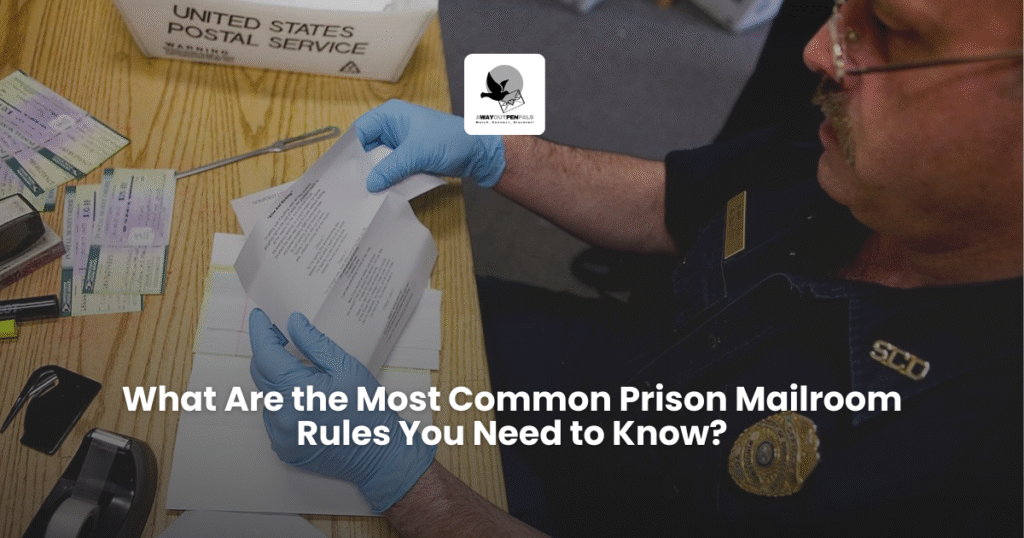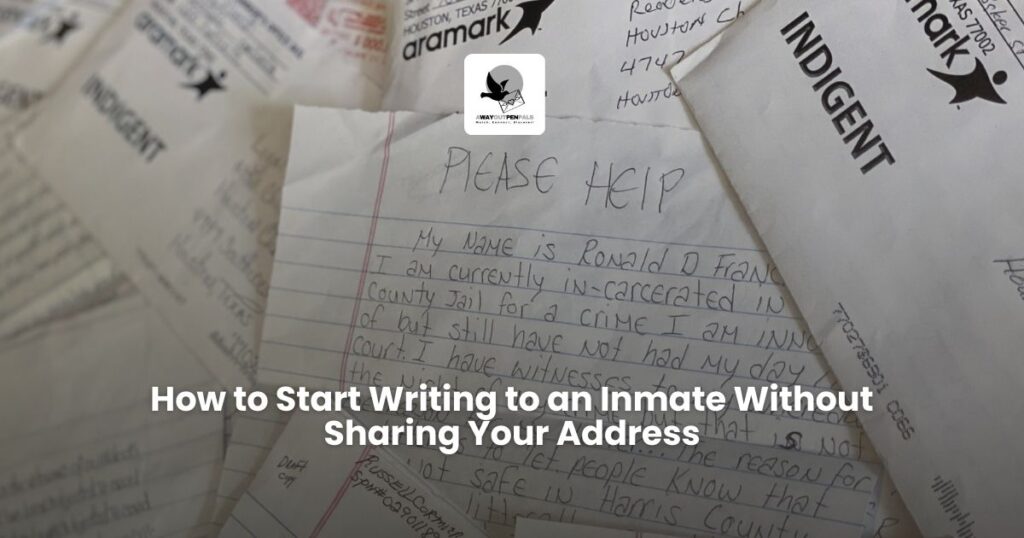Ever wonder if a simple letter could change someone’s life?
You’re not alone.
A lot of people feel pulled to write to someone in prison… but then the doubts start to appear:
- Is it safe?
- Will my words even matter?
- What if I get too emotionally involved?
These are valid questions. And you’re not being dramatic, you’re being thoughtful.
Writing to an inmate isn’t just a kind act. It’s a powerful form of connection, one that builds hope for them and purpose for you.
Let’s explore 5 real ways letter writing changes lives, theirs and yours.
1. Loneliness in Prison Is Crushing Your Letter Can Break the Silence
Silence isn’t a choice for everyone. For many in prison, it’s the only thing they hear.
There are no calls, no letters, just silence, day after day.
A place where birthdays pass with no cake. Holidays with no family. Weeks with no one saying your name.
That’s life for many inmates: complete emotional isolation. And that’s exactly why writing a letter to someone in jail matters.
Research from the University of Warwick has found:
Prisoners involved in the pen pal program say the prison pen pal scheme made them feel less isolated, helped change their self-identity, provided a distraction, boosted their happiness and raised their hopes for life beyond prison.
Loneliness isn’t just hard, it’s damaging. Regular letters can be a lifeline.
Tips to break their Silence:
- Write Regularly: Writing letters consistently helps. Set a reminder to write once a week or even once a month.
- Make it personal: Use their name, ask about their week. Try to comment on something they wrote previously to make them feel you paid attention.
- Talk normally: Share small aspects of your life, like your favorite meal or a recent movie you watched, to provide a sense a normalcy.
2. You Remind Them They’re Still Human
You remind them they’re still human, even when the world feels like it’s forgotten them.
Prison can strip people of their identity. But your letter reminds them who they really are, beyond their crime or sentence.
Many inmates carry deep shame. A simple, thoughtful message can shift how they see themselves.
These small reminders can help them rebuild dignity and start to spark hope for a future beyond prison walls.
Tips for small reminders:
- Speak to their humanity – Remind them they’re more than their past.
- Share uplifting stories – A funny memory or a favorite quote goes a long way.
- Reinforce self-worth – Say things like, “You’re not your mistakes — you matter.”
- Keep it light when needed – Joy helps restore identity.
3. Extending Encouragement
Sometimes, a single kind word can be the lifeline someone desperately needs.
Prison is filled with negativity and doubt. In that tough environment, your kind words of encouragement can uplift spirits and bring hope to someone’s life.
Here’s How You Can Encourage Them:
- Celebrate their strengths and progress: Even small victories matter. Saying something like, “I see how hard you’re trying, and that’s something to be proud of,” can make a big difference.
- Offer genuine recognition: Acknowledging effort boosts self worth and motivates positive change.
- Keep your messages consistent: Regular words of support show that someone cares no matter what.
Your words have the power to brighten dark days and help someone believe in a better tomorrow.
4. You Grow Too In Ways You Don’t Expect
Sometimes, you write to lift someone else… and end up lifting yourself.
When writing to a prisoner, we often begin with the intention of offering support. But something surprising happens along the way….you start to change too.
Writing a letter to someone in jail can shift your perspective. You begin to see resilience in raw stories, gratitude in small moments and humanity where society often forgets to look.
Here’s how to make that growth happen:
- Ask meaningful questions. Try: “What’s something small that made you smile this week?” or “What does a good day look like for you in there?” These invite connection beyond surface level chat.
- Reflect in your letters: Share how their answers impact you, it shows you’re listening and learning too.
- Stay open-minded: When writing a letter to someone in jail, especially through a prisoner letter writing program, approach it with curiosity, not judgment.
Whether you’re sending letters of encouragement for prisoners or just beginning your journey writing to an inmate, remember this: growth happens on both sides of the page.
5. Letters Support Healing and Rehabilitation
Healing doesn’t always start with therapy. Sometimes, it starts with a letter.
Writing to a prisoner, whether it’s a short note or a long message, can be a powerful act of connection. It’s not just emotional support. It’s a proven way to help someone heal, grow, and reintegrate into society.
According to the Vera Institute, incarcerated individuals who maintain positive contact with supportive people on the outside are significantly more likely to succeed after release. Those who regularly connect through letters, especially with consistent encouragement and positive conversations, are less likely to be re incarcerated and more likely to secure stable housing and employment.
That’s the kind of impact your letter can have.
Ways to Support Healing Through Letters:
- Write regularly. One letter helps, but consistent letters build trust and hope.
- Encourage often. Say: “You mentioned you love drawing — I’d love to hear more.”
- Look forward, not back. Ask: “What’s one thing you’re proud of this month?”
- Keep it real. Share a quote, a funny moment, or something from your day — little things mean a lot.
Yes, It’s Safe When Done Right
Still nervous? You should be if you don’t take precautions. But done wisely, writing to prisoners is perfectly safe.
You don’t have to share your address. You don’t have to respond to anything that makes you uncomfortable. You’re in control.
Programs like A Way Out Pen Pals are built for your protection.
Try this:
Set your own boundaries. Only write when you feel emotionally ready. Use pen names or digital mail systems when possible.
Final Thoughts
When you’re writing to a prisoner, you’re not just sending ink on paper, you’re sending presence, possibility, and a reminder that they still matter.
You shatter the silence.
You reflect their humanity back to them.
You offer hope in a place built to crush it.
And along the way, you grow too, with every story shared and every perspective shifted.
It’s not about fixing anyone. It’s about seeing them. Hearing them. Reminding them that even behind walls, they’re not forgotten.
So grab that pen.
Write that first line.
And let your words become something more, a spark that changes two lives, not just one.
FAQs:
1. How do I start writing a letter to someone in jail?
Start by introducing yourself and explaining why you’re writing. Keep it positive and friendly. If you’re nervous, just be honest. Writing a letter to someone in jail is about showing kindness, not perfection.
2. What should I include when writing to an inmate?
Keep your letters uplifting. Share personal stories, ask open-ended questions like “What’s something that made you smile recently?”, and offer encouragement. Letters of encouragement for prisoners can really boost their morale.
3. Is it safe to send letters to prisoners?
Yes, when done thoughtfully. Use official pen pal programs or digital mail systems that protect your identity. When writing to a prisoner, you’re in control of what you share, including your name and address.
4. How often should I be writing letters to prisoners?
Consistency matters. Writing regularly, even just once a month, builds trust and gives inmates something to look forward to. It’s not about quantity, but quality and reliability.
5. Is writing to women in prison any different?
Not really. Women in prison face similar emotional challenges. Whether you’re writing to women in prison or men, the goal is the same: offer support, dignity, and human connection.







